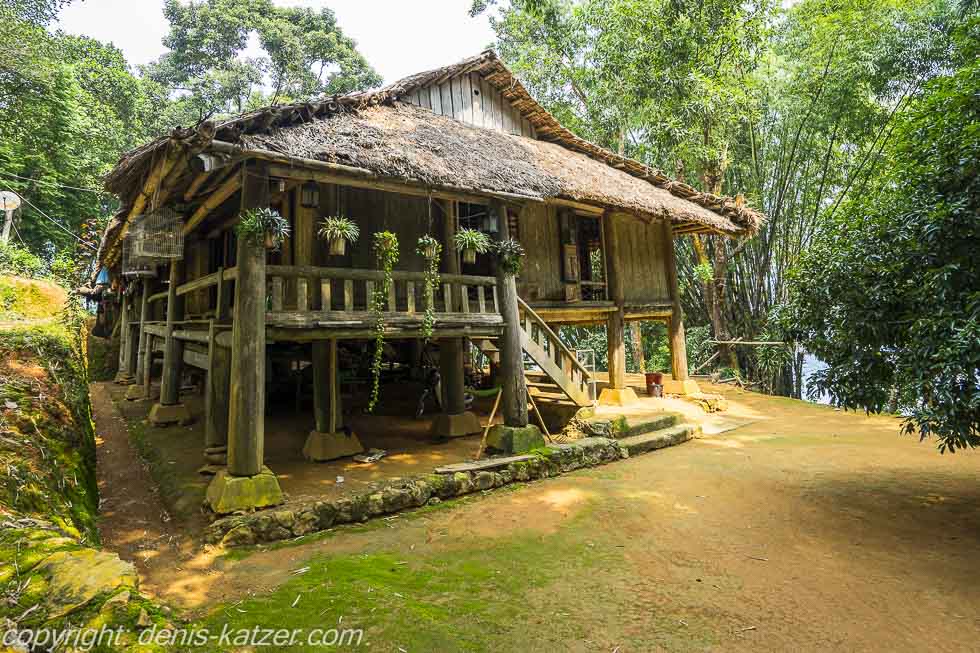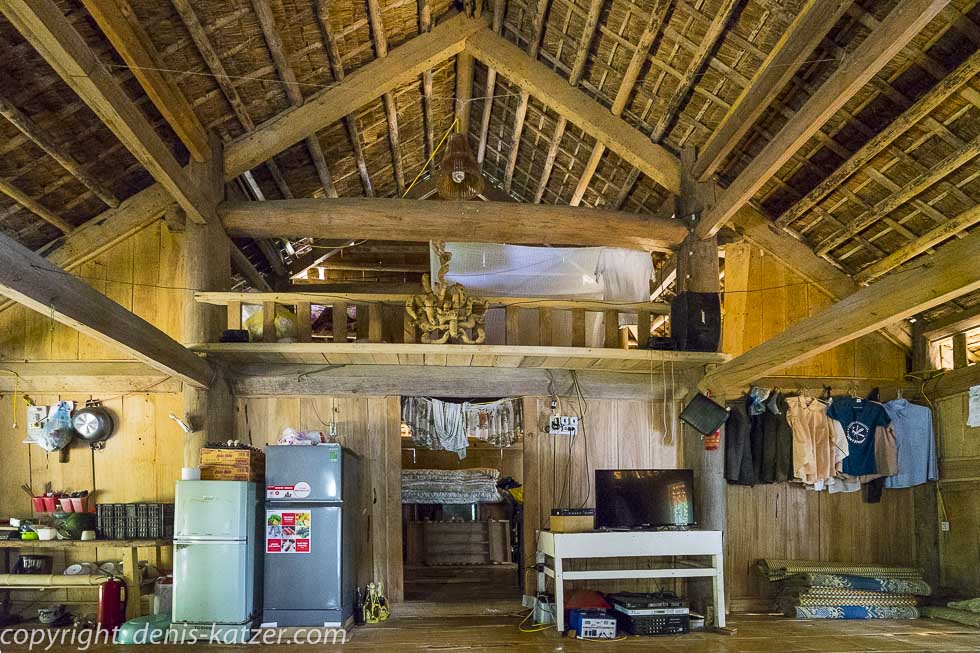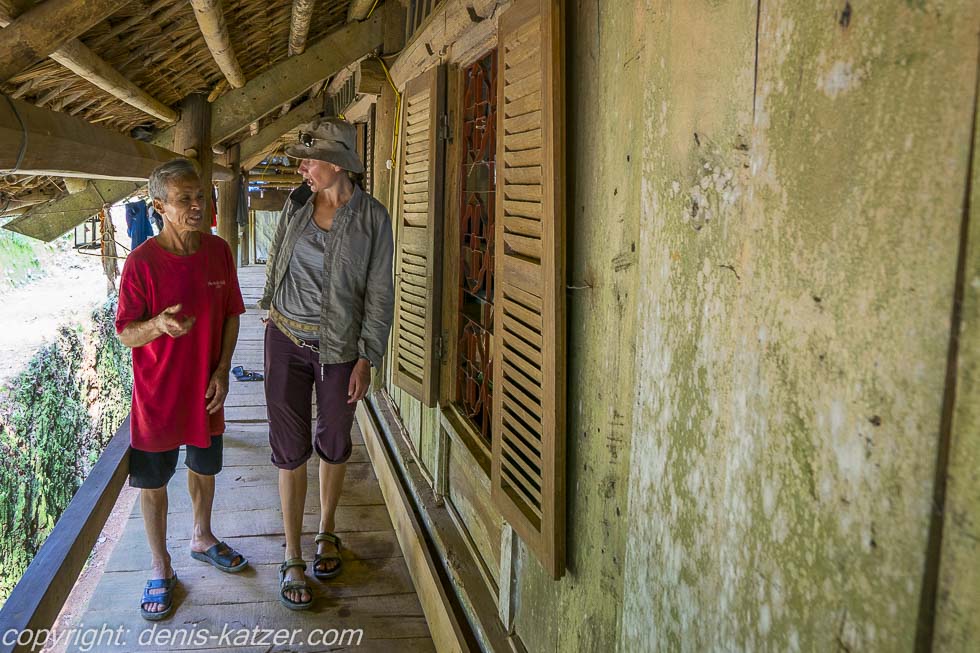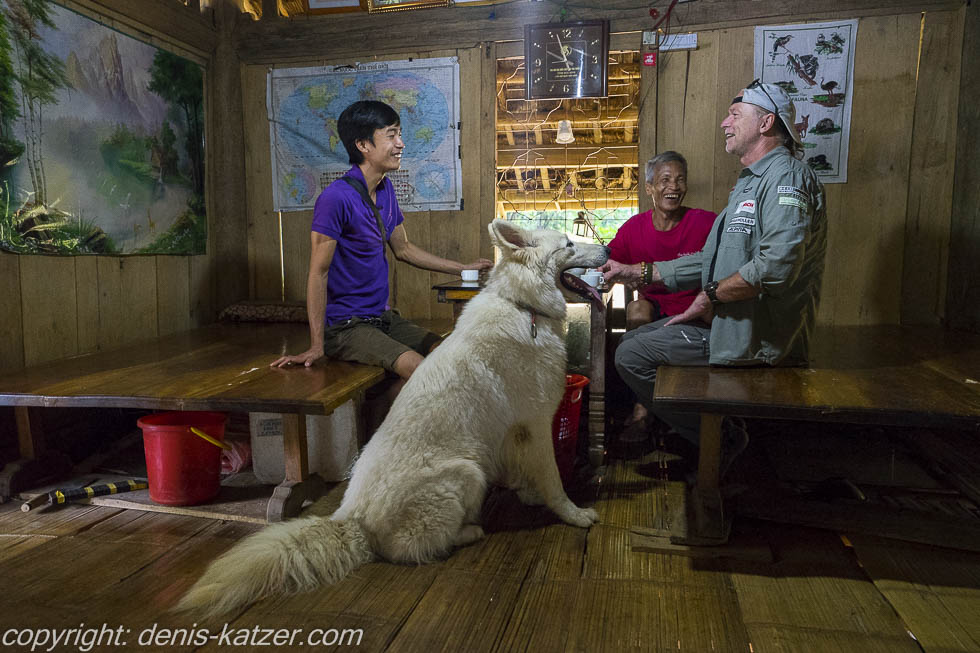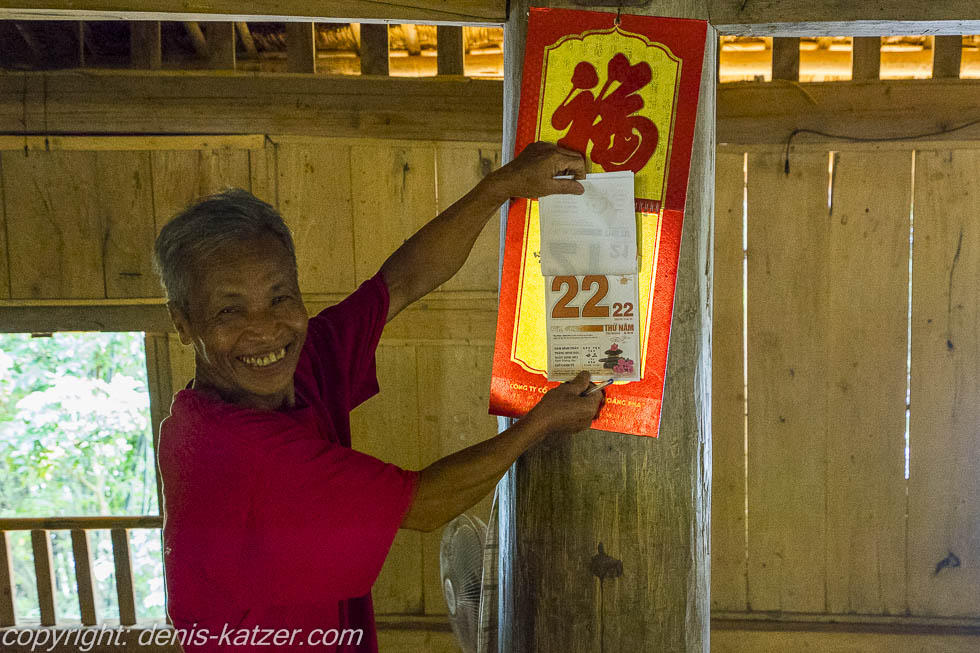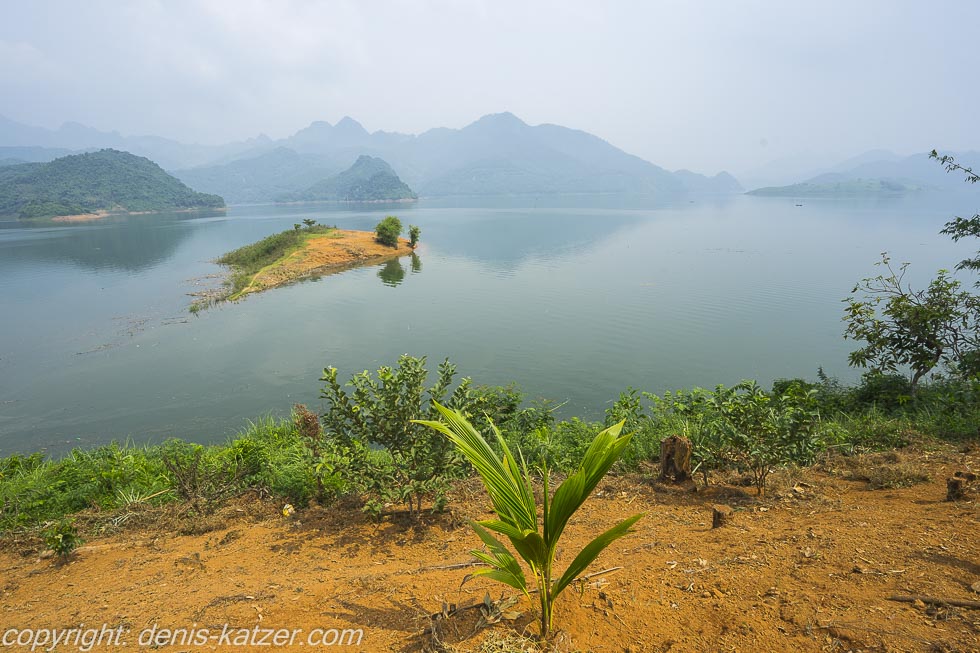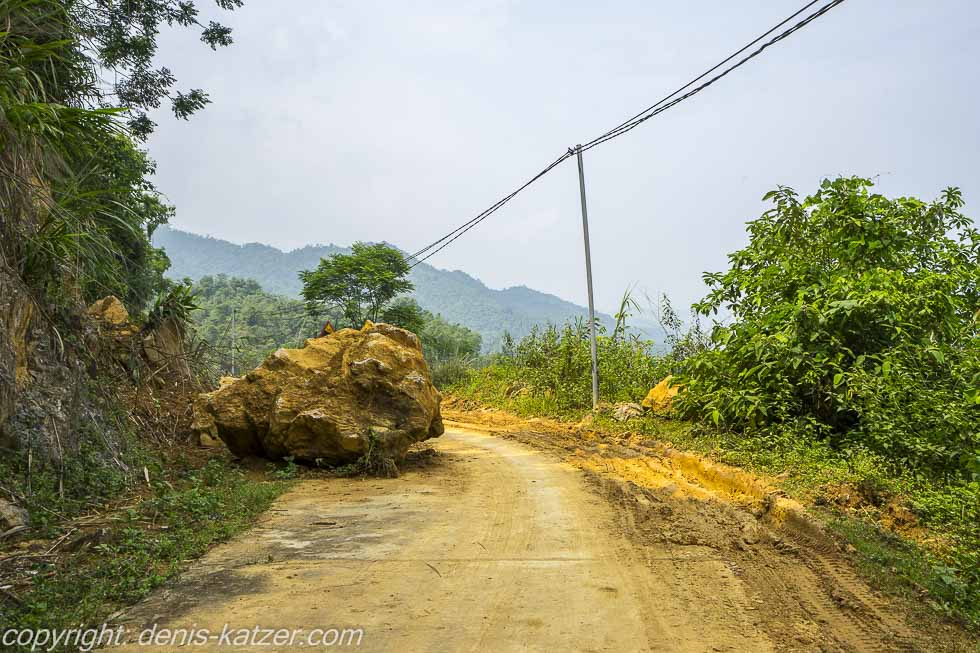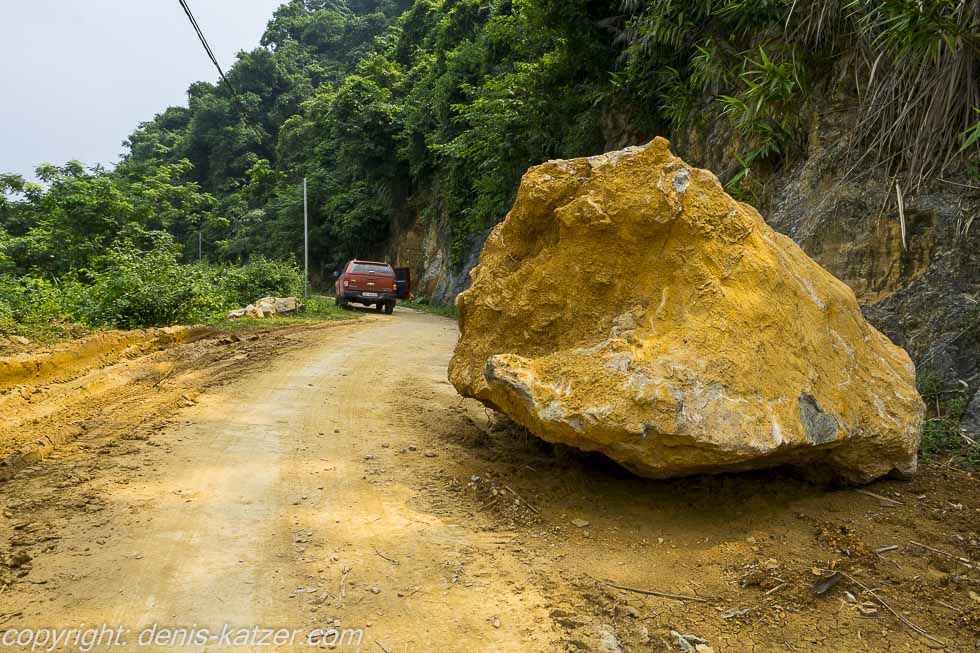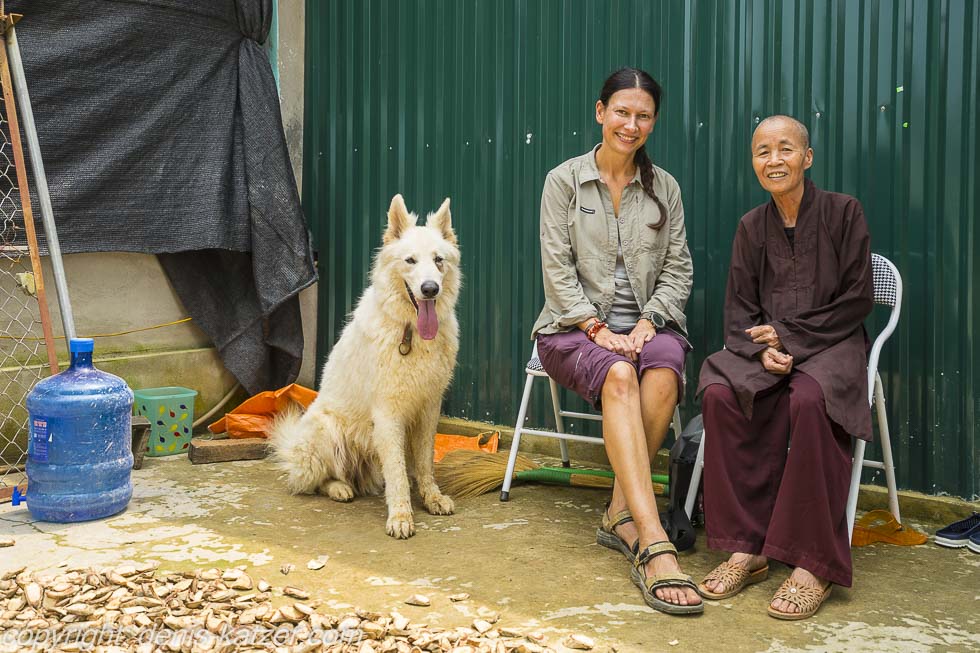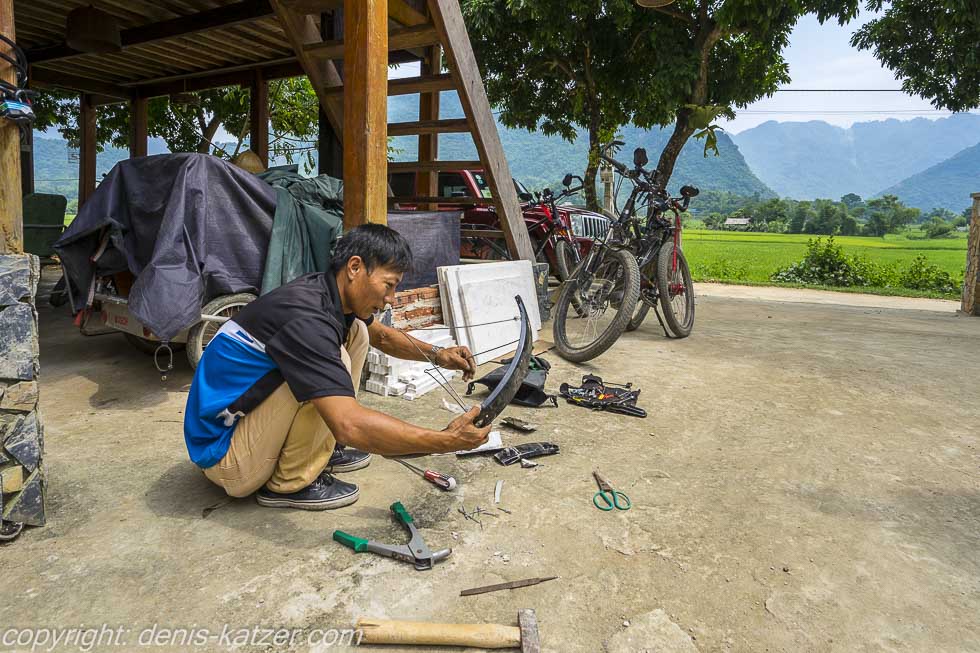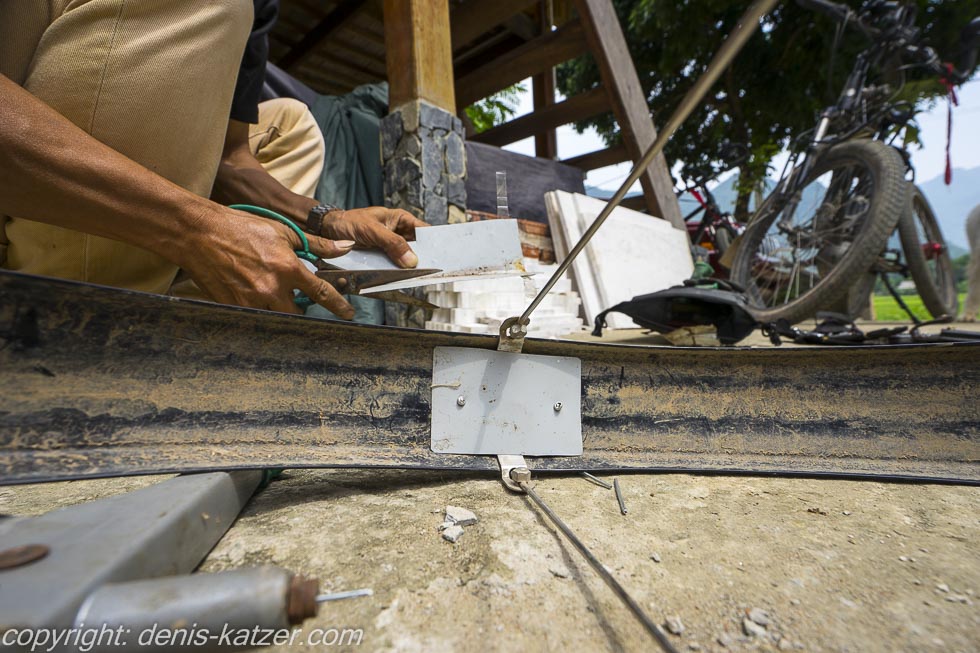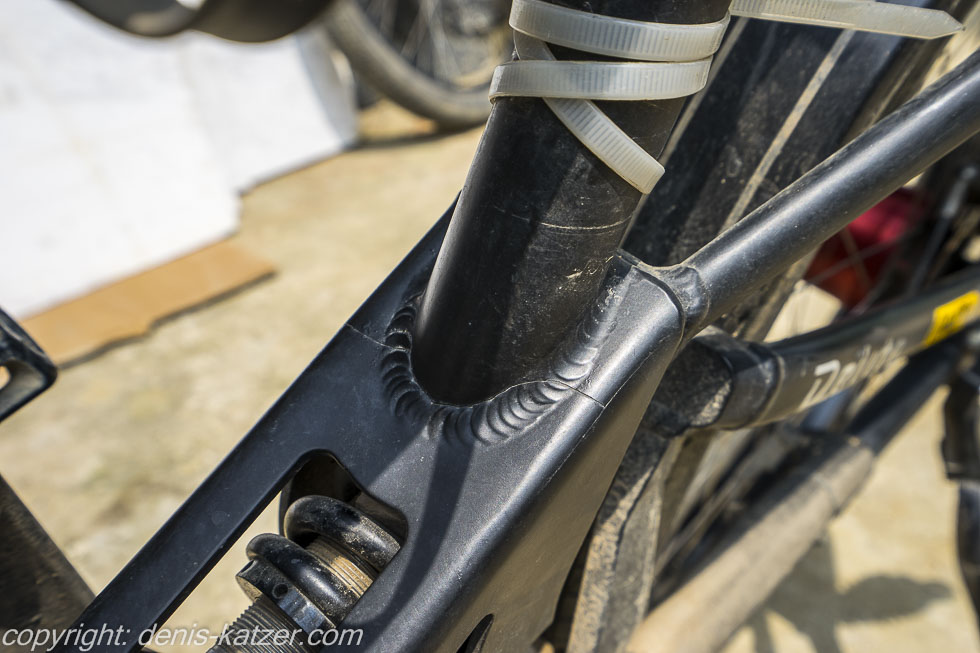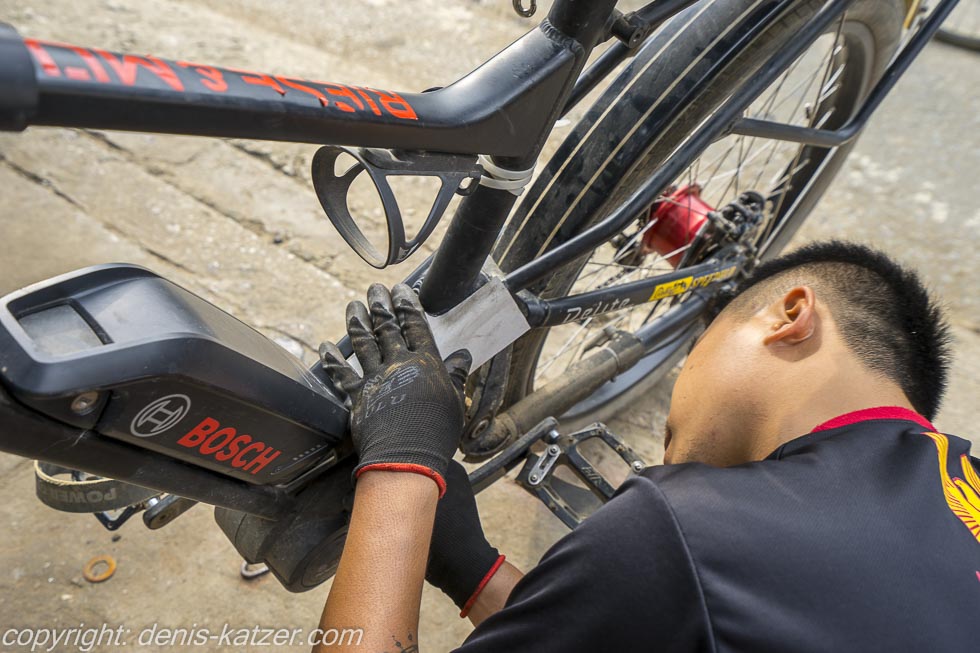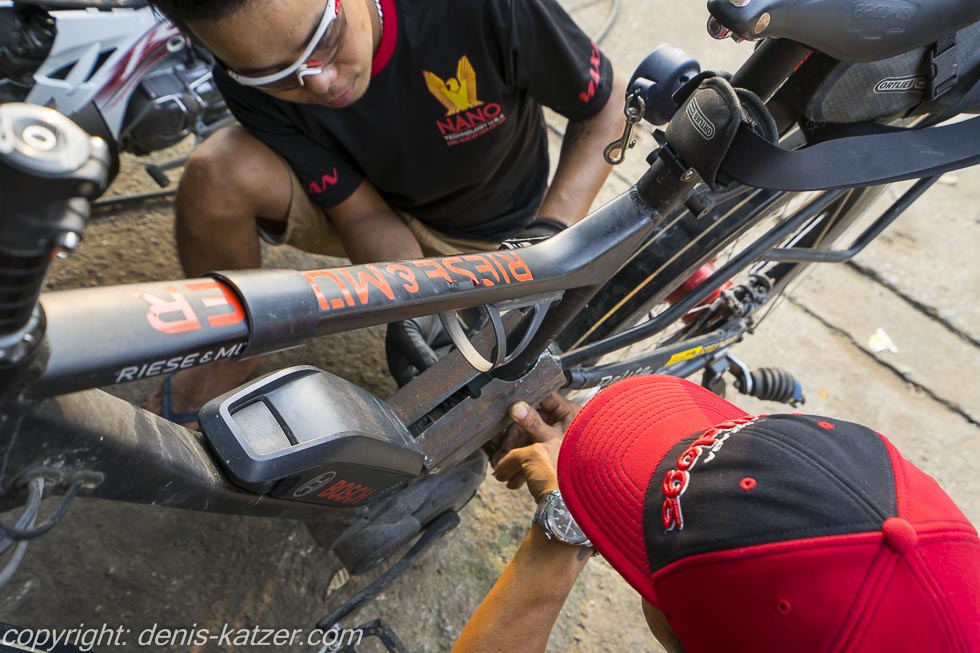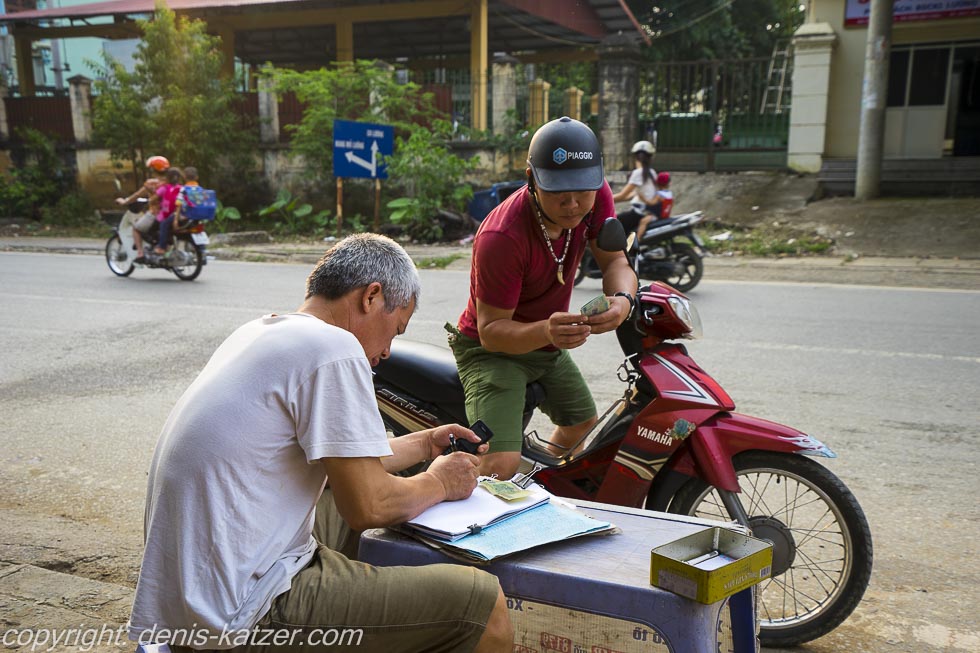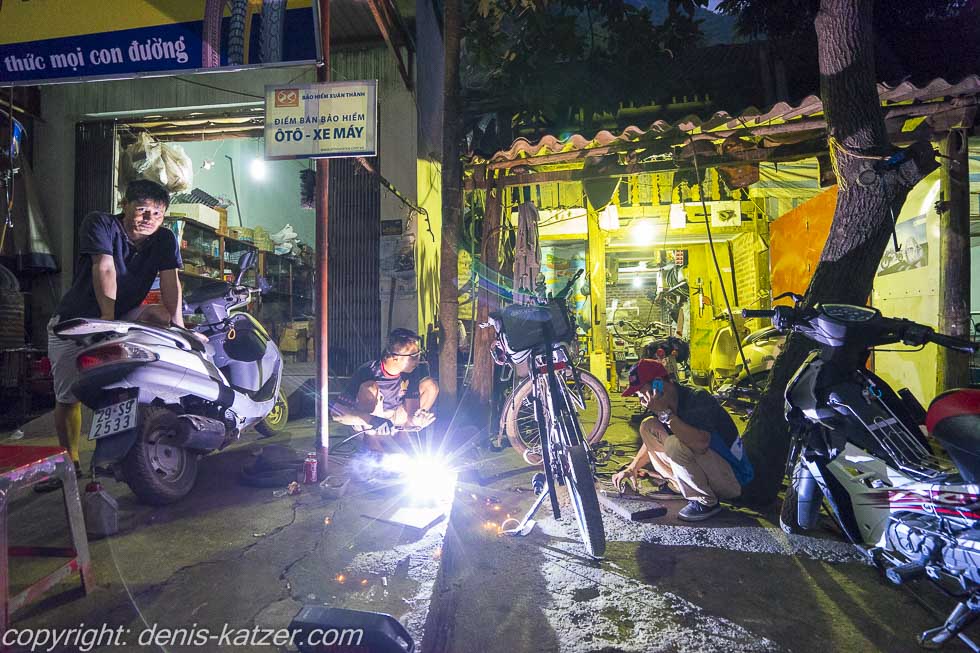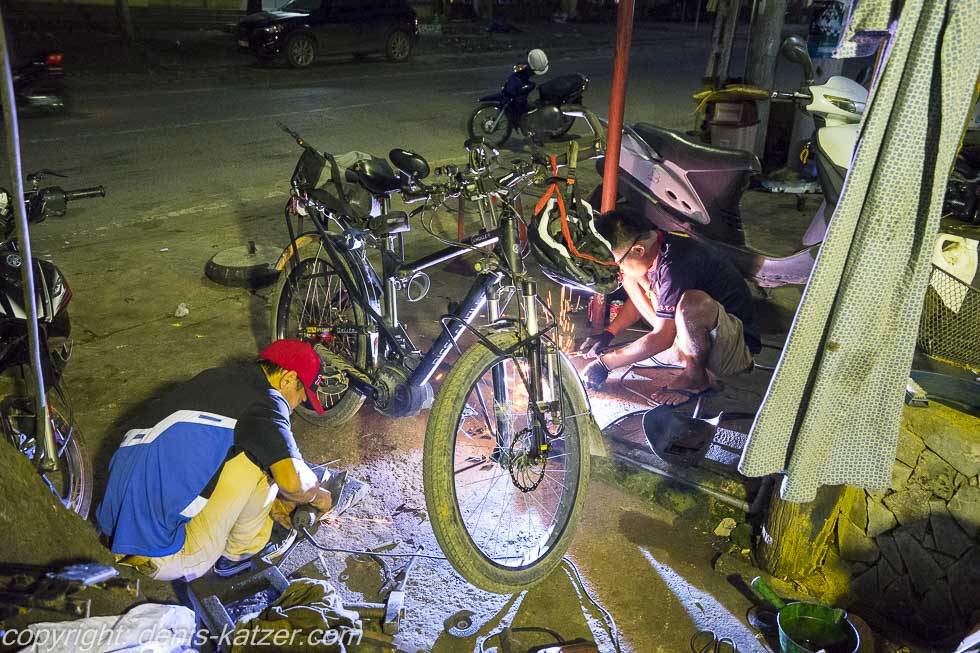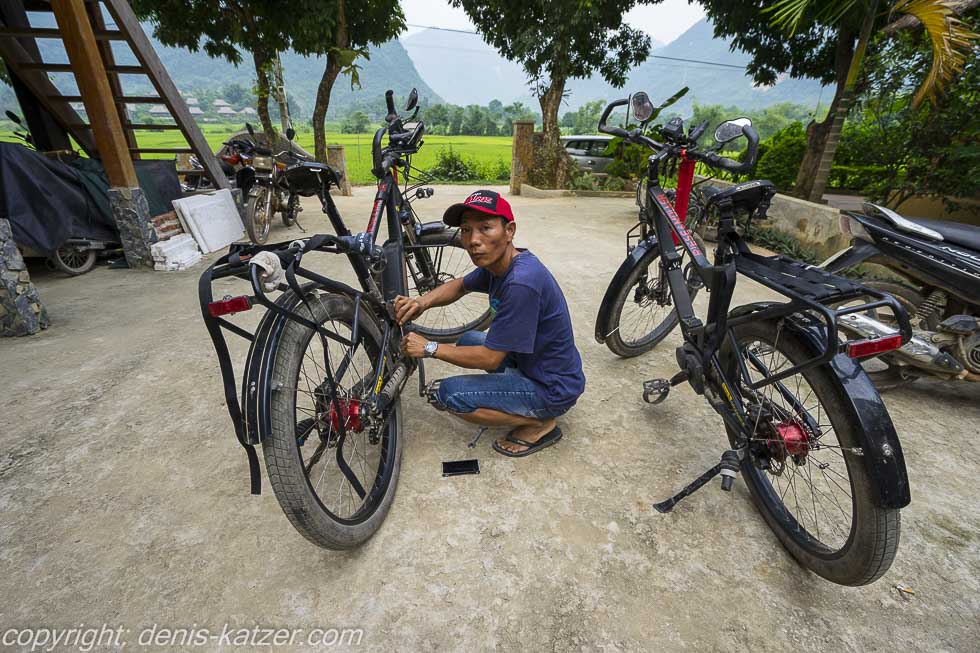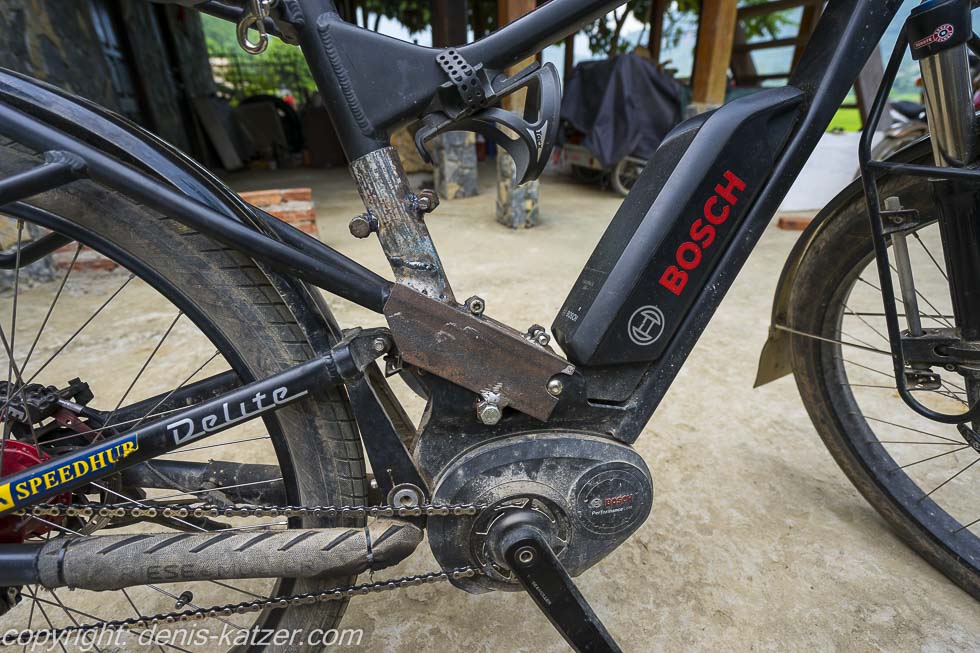
Scouting the route – frame breakage crosses our plans again
N 20°39'14.6'' E 105°04'01.5''
Date:
15.09.2016 until 22.09.2016
Day: 447- 454
Country:
Vietnam
Province:
Hòa Bình
Location:
May Chau
Latitude N:
20°39’14.6”
Longitude E:
105°04’01.5”
Daily kilometers:
80 km covered by car
Total kilometers:
18,496 km
Soil condition:
Asphalt / gravel
Maximum height:
1.000 m
Total altitude meters:
54.661 m
Sunrise:
05:46 h 05:48 h
Sunset:
6:03 p.m. 5:57 p.m.
Temperature day max:
35°C
Temperature day min:
24°C
(Photos of the diary entry can be found at the end of the text).
After the first test rides went well, we decided to continue our bike tour in a few days. There are officially three ways to leave our rice paddy valley. One of them leads through the valley in a southerly direction. As this road is currently under construction and involves a massive detour, it is out of the question. Another winds its way over a high pass in an easterly direction. This is the shortest route to Hanoi and the World Heritage Site of Halong Bay. “Think that this mountain range is too strenuous for your shoulder,” says Tanja, who knows it because she picked up our passports from Hanoi some time ago. “The bus took ages to finally reach the top. Just thinking about having to pedal our bikes up there after the long break makes me feel dizzy.” “If you ride to the Hoa Binh reservoir, you can avoid the pass. There’s hardly any traffic on the little road and it’s picturesque. There are also only a few climbs and I know a small homestay at the lake where you can spend the night,” Manh suggests. “OK, then we’ll go to the reservoir,” I reply. “Certainly the better choice, but some sections of the road are without asphalt.” “So not a good choice after all?” I say disappointedly. “No, no, it’s not that tragic. But you should have a look at the slope first. If you want, I can give you a lift in my car. Then you can decide afterwards with a clear conscience which connection you want to take.” “A great offer. Thank you very much. When do you have time to go exploring?” “If you like, we can set off straight away.” We hurry to our room, get our cameras, put on something else and 15 minutes later we’re sitting in Manh’s car. After a few kilometers we leave the main road. The off-road vehicle follows the narrow track. We cross a few simple villages, stop at a waterfall to take a few photos, when the asphalt suddenly disintegrates. Downhill, through rain-filled potholes, over scree and clay. Then bitumen appears again. “What do you think Denis? Can we get through without a problem? Do you think your shoulder is up to it?” asks Tanja. “No problem,” I reply confidently. Half an hour later, Manh turns off his four-wheeler. “We still have to walk a bit from here,” he says. A bamboo forest arches over our heads. We are greeted by dark greenery steaming from the tropical rain. Thousands of cicadas make noise that makes our ears ring. Suddenly it becomes light again and the Hoa Binh reservoir lies before us in a hazy bluish light. “The homestay is in the bamboo grove over there,” Manh explains, pointing to a green island of trees. As soon as we arrive, we are greeted by a friendly little man. He laughs exuberantly, squeezes our hands and invites us to come into his stilt house. “You can spend the night here,” he says, still laughing, pointing to a large room that is not divided by walls. “Sit down,” Manh translates the words of his old friend. We settle down on dark brown wooden benches. Huong immediately offers us tea. As we continue our joyful conversation, my gaze falls on a few framed pictures hanging on the wooden wall. “That was me during the war,” says Huong proudly pointing to one of the pictures. “Are you wearing a medal on your shirt in that picture?” I ask. “Yes, yes. I shot down an American bomber with my rifle,” he replies, his chest swelling with pride, taking an imaginary rifle in his hands and firing it at the high wooden gable of his stilt house. “I was a good shot and was celebrated as a hero. We saw how the American soldiers jumped out of the smoking plane with their parachutes. Ha, ha, ha,” he explains, tapping his thighs with laughter and mirth. We continue the conversation for a while until we say goodbye again and fix our arrival date for September 22. “I’m looking forward to seeing you,” we understand, because Manh translates his words.
Further along the track, Manh steers his car around boulders the size of houses that have been washed out of the mountainsides by the heavy tropical rain of recent weeks. “You shouldn’t be out and about here when it’s raining. Rockfall and landslides make this slope dangerous,” warns Manh.
On the way back, we visit Manh’s mother, for whom he is having a house built in Mai Chau. “My sister, who has cancer, will also live here,” he explains. “Your sister has cancer?” I ask. “Yes, but after treatment with our traditional medicine, she got well again. My sister is absolutely convinced of the healing power of natural medicine. She is now studying traditional medicine at university in Hanoi. After her recovery, her biggest dream is to be able to help other people. I finance the house and her studies. Almost all my money, which we earned from the sale of my shares in our nature lodge, has gone towards helping my family.”…
Hung, the filmmaker and co-owner of the lodge, came all the way from Hanoi last night to shoot a movie with and about us today and tomorrow. We sit with him and a journalist, who also acts as translator, over breakfast to discuss the script and the schedule. Even during the interview, Hung takes out his cameras and films for all he’s worth. Two weeks ago he made an image film about the lodge, in which we play a role as foreign guests. The new short film will report on our travel life and will be broadcast on national TV. Two hours later, we agree to continue in the afternoon. I use the time to get our bikes ready for the departure planned for tomorrow. Vinh helps me repair the broken mudguard on Tanja’s bike. So far, I had only glued it together with gaffer tape. Vinh, who is overseeing the ongoing construction work on the new bungalows, is a very talented craftsman. He immediately grabs a pair of riveting pliers, a thin piece of sheet metal, a pair of tin snips and gets to work. It doesn’t take long and the mudguard is as good as new. “It doesn’t look good. I’ll spray it black later,” he says. “It doesn’t have to be. The main thing is that it lasts,” I say and start to clean and oil the chains and remove the worst of the dirt from the wheels. I’m just about to roll my bike under the canopy when I notice a stripe on the seat tube. I get my cleaning rag again to remove this too. “Stubborn stuff,” I curse quietly after I can’t get rid of the dirt. Then I scratch over it with my fingernail without success. “What’s that?” I think aloud, putting on my glasses to take a closer look at the strip. “Oh God! That can’t be right?” I scrape and scrape again but the stripe remains. On closer inspection, no doubt remains. The frame of my bike is broken. The realization runs boiling hot through my body. Is this the end of our cycle tour? The frame is made of aluminum. Who is supposed to professionally weld an aluminum frame in Vietnam? And why is the frame broken? What a stupid question. The fall! Bloody hell. When I fell off the bamboo bridge, I fractured my acromioclavicular joint and my bike broke its frame. I immediately rush to Tanja to tell her the bad news. “And you’re absolutely sure that the frame is broken?” “Absolutely. No doubt about it. The crack runs along the entire weld seam. We can’t ride the bike any further.” “Can’t be true.” “But unfortunately it is true.” “And what do we do now?” “I have no idea. I’ll go to Vinh and ask him. Maybe there is a miracle after all,” I ponder and trudge off. Vinh immediately inspects the damage and says that he will have a kind of iron claw welded around the break. “And you think it will last?” I ask very skeptically. “Sure, the frame won’t break any further with the claw. Definitely not.”
We are just about to find out who in the village can weld the iron claw when Hung comes by. “I’m sorry for your movie but we can’t leave tomorrow,” I say, because the departure scene and riding with heavily loaded bikes is supposed to be an important part of the movie. There is no reaction on Hung’s face. “The iron claw won’t work,” he says. “And how should we continue? The breakage needs to be repaired.” “We have to get your bike to Hanoi. There are professionals there who can weld aluminum,” he replies and immediately gets on his smartphone to make use of his extensive contacts. Meanwhile, I go back to Vinh and explain that we will probably have the break welded in Hanoi. After the filmmaker Hung has found the right workshop and we all agree to have the frame welded there, Vinh shows me a three-dimensional computer drawing he has just made. “Looks good. And you think it’s possible to have a part like this welded on site?” “No problem.” “When can we start?” “Is this afternoon at 3 p.m. okay for you?” “Perfect,” I reply and cancel the welding at Hung’s again as we’ll save a lot of time with the iron claw method.
When we later explain our plans to the mechanic at a simple moped workshop in Mai Chau, he yawns exuberantly. Then he scratches his head, not without opening his mouth wide several times to make more yawning noises. The sight of him makes me lose faith in Vinh’s idea. “Somehow this can’t work,” I think to myself. Then the mechanic furrows his brow. He shakes his head again and again and the creases in his forehead pile up into a high mountain range. Scratching his head again, he gets on his moped and speeds off. “What now? Is he going to do the job or not?” I ask Vinh. “He’s just getting the materials and he’s about to start.” “Good,” I say with relief, but I’m no longer sure whether the iron claw is the right solution. After the mechanic comes rattling back in, he begins to cut up a piece of rusty iron with the angle grinder, visibly listless. Using pen and paper, he makes a rather imprecise template. I look nervously into Vinh’s eyes. “Not a good mechanic,” he says in English. “What does he actually want for the job?” I ask, so as not to be surprised by another exorbitant price. “He is expensive and wants 400,000 dong.” (16,- €). “If it works, it’s okay,” I reply with relief. Because Vinh is not happy with the mechanic’s work, he starts to help him. Now they are both flexing, welding and filing the iron claw. “Looks like a bandage,” I say after the bulky thing takes shape. “Ha, ha, ha. Hiệp hội, (bandage) that sounds funny,” he says in Vietnamese. Three hours later, the Hiệp hội is still not ready. I nervously walk up and down the street. Lottery sellers have set up their small tables and stools on the sidewalk to offer their tickets to passers-by. “Why don’t you play too?” the locals ask me. I laughingly decline. “How do the ticket buyers get their winnings paid out?” I ask Vinh, who is in the process of removing the rust from the Hiệp hội with the grinder. The buyers have to go to the seller tomorrow with their number, who then compares it with the winning numbers on a list. Smaller prizes of around 2 million dong (€80) are paid out directly. The bigger prizes have to be collected by the lottery company.” “And what does a lottery ticket seller earn?” I ask. “I’m not sure, but I think he gets 100 dong (€0.0040) commission for every 10,000 dong (€0.40) bet.” “Oh dear. That’s nothing. The average stake of most of the players I’ve observed is 50,000 dong (€2) and now that about 10 customers have bought from him, he’s already packing up his table and chair again. That means he has only made 5,000 dong (€0.20) commission.” “Not every day is the same. Sometimes he earns more, sometimes less,” replies Vinh. I stand there thoughtfully and look at the welding and flexing work on my bike. Above all, I think about the fact that the mechanic earns 400,000 dong in four hours, while the lottery ticket seller theoretically earns around 20,000 dong (€0.80) in the same time. “Wow, the world really isn’t fair,” I groan out loud. “What?” asks Vinh. “Oh, nothing. I was just thinking out loud,” I reply.
It is already dark when the ugly, chunky Hiệp hội (bandage) massively encloses the breaking point of the extended seat tube. “Looks bad,” says Vinh. “Hm, I don’t really care. The main thing is that it holds.” “It will hold. I’m sure of that. The only question is what your bike sponsor will say about this horrible-looking work?” “I have no idea. But I think he’ll be glad that I met you and that you made our journey possible with your idea.” “Hm, I hope so. Tomorrow I’ll buy a can of black spray paint and spray the Hiệp hội. Then it won’t stand out quite so much.” “Thank you. You really did a super good job,” I say. Then I hand the mechanic his 400,000 dong and say goodbye.
Manh comes to see us this morning. “I heard about the broken ramen. I’m really sorry for you.” “Not so bad I hope. Vinh has given the frame a hội hộp hội. I think we’ll set off tomorrow.” “Can I have a look at the bike?” “Sure,” I reply and pull off the waterproof tarpaulin under which the bikes are stored. “Oh man Denis! That looks terrible. I don’t think it will last. I think you should have the frame welded in Hanoi. It’s much stronger and will last.” “But how are we supposed to get to Hanoi with the broken bike?” “I’ll drive you there. I have to go back to the capital tomorrow anyway. I can give you a lift if you want.” “You would do that for us?” “Of course I would. You’re my friend.” “Okay, then that’s what we’ll do. We’ll accompany you to Hanoi tomorrow…”
If you would like to find out more about our adventures, you can find our books under this link.
The live coverage is supported by the companies Gesat GmbH: www.gesat.com and roda computer GmbH http://roda-computer.com/ The satellite telephone Explorer 300 from Gesat and the rugged notebook Pegasus RP9 from Roda are the pillars of the transmission. Pegasus RP9 from Roda are the pillars of the transmission.
